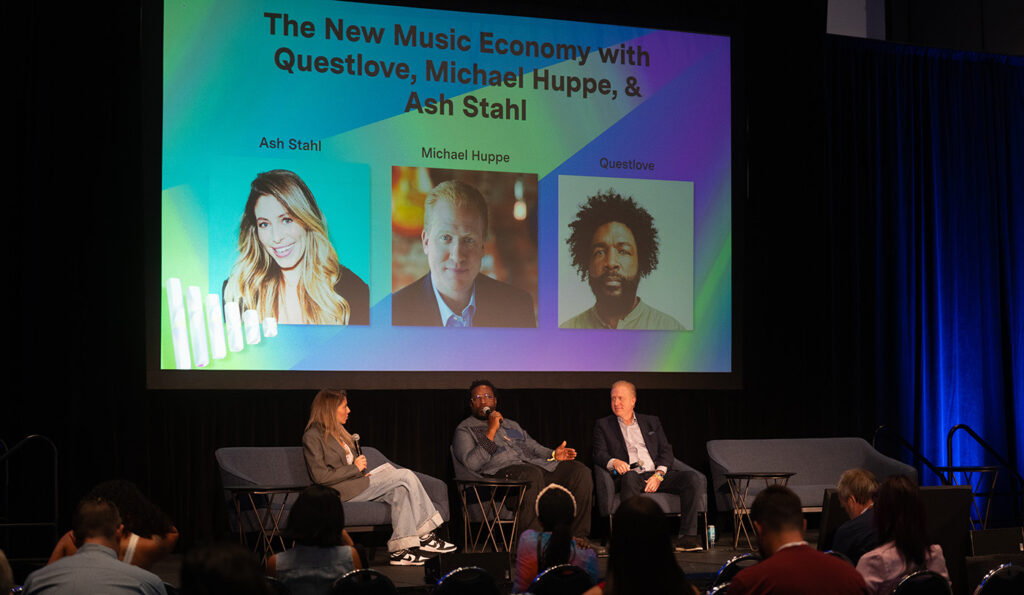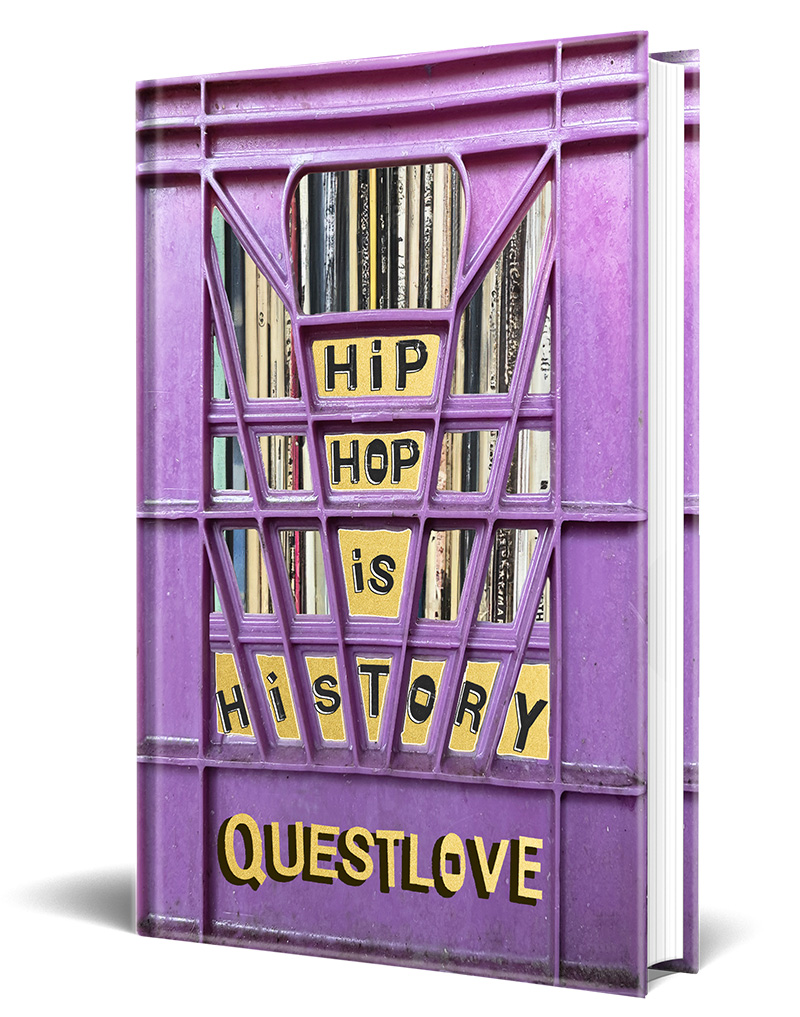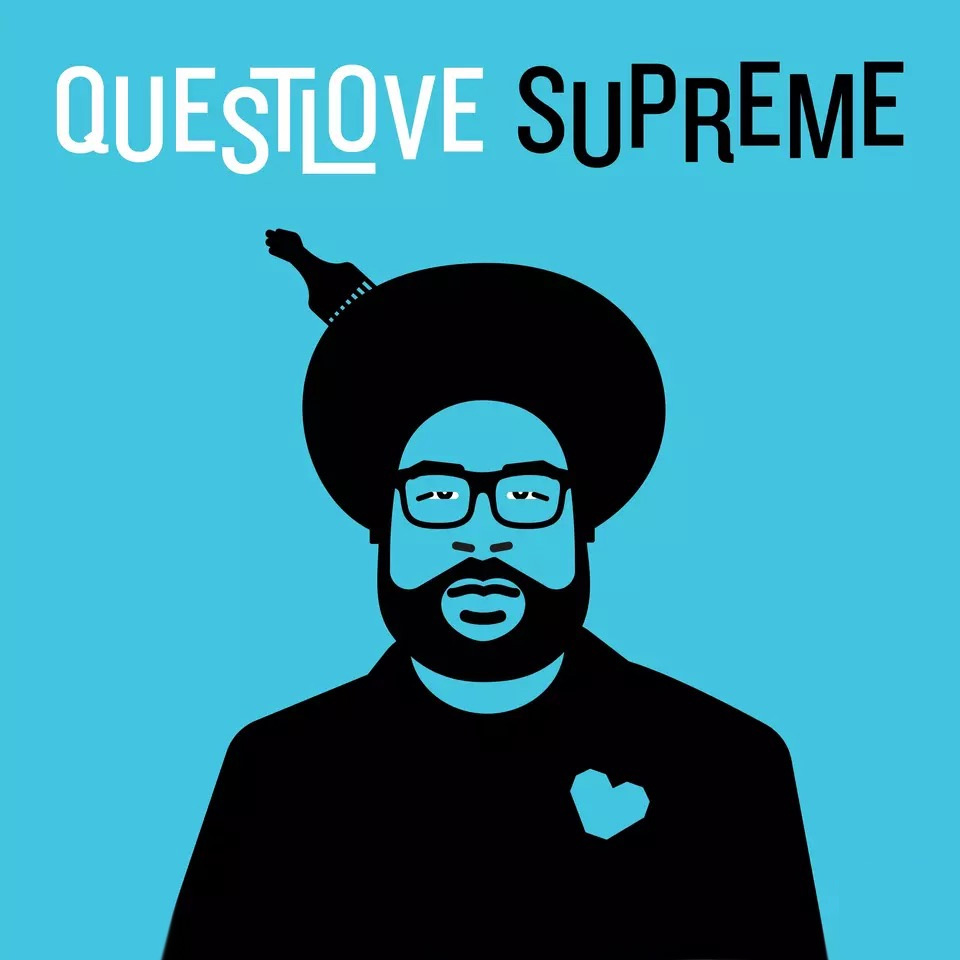QUESTLOVE
This SoundExchange Creator Spotlight feature is drawn from Questlove’s Vidcon Anaheim 2024 discussion with SoundExchange President & CEO Michael Huppe, moderated by Flighthouse CEO Ash Stahl and has been edited for length and clarity.

Ahmir K. Thompson – the multihyphenate better known as Questlove – is the epitome of a diversified creator. Along with Tariq Trotter (aka. Black Thought), he is the co-founder/co-frontman and drummer of the influential Philadelphia-based hip-hop group The Roots. He’s also a late-night television mainstay on NBC’s The Tonight Show with Jimmy Fallon, where The Roots have been the house band since 2014.

As if that wasn’t enough, he’s also a successful podcast host (Questlove Supreme), music producer, DJ, author of several books, educator, stage producer (Fela!), and film producer and director (Summer of Soul (…Or, When the Revolution Could Not Be Televised)). And in 2011 Rolling Stone named him number two on its “50 Top Tweeters in Music” list, behind only the once-prolific Kanye West. But his bonafides go even deeper.

“I’m part of the first wave,” Questlove said of his long social media presence. “Back when artists just had websites, to what I would say is kind of the penultimate level to what we know as social media.”
He’s referring to Okayplayer, The Roots’ website turned cultural juggernaut that he describes as “a music playground [where] all like-minded artists can talk about music,” founded in the late 1990s. Based on then-emerging tech – America Online – that the Beastie Boys’ Mike D and Ad Rock showed him a few years earlier while on tour, the site included a chat room where Questlove and his bandmates could interact directly with fans.
“I think it took maybe three months for the fan base to get over the fact that, ‘Wait a minute, I’m talking to the actual Questlove, right?’,” he said. “And then someone told me, turn it into a mall. In other words, you own the building, but you tell Erykah Badu, ‘We’ll build your space and bring your fan base, and then D’Angelo’s.’ Suddenly Okayplayer became the left-of-center music mall and then I started noticing that journalists would creep in and take all of our hot takes and build their entire articles on our ideas. And then that’s when I knew, and it was before Twitter, but basically that was social media without me knowing.”
The digital world has greatly changed since those pioneering early days, but one thing that hasn’t changed is Questlove’s use of social media to talk directly to fans and fellow enthusiasts about the things that move him.
“I have accounts on all the platforms,” he said, admitting that he is most active on Instagram. “I guess right now, [it’s] my safe haven, where all my friends are, because I think my main account is less about promoting me as a brand and more about me interacting with my, yeah, music nerds. So, I guess IG is my weapon of choice right now.”
While late night appearances were once defining, make or break moments in an artist’s career, Questlove has seen firsthand the influence shift to social media.
“[The Tonight Show with Jimmy Fallon] was one of the first earliest shows to really invent the idea of television leaving terrestrial television and being more about the next morning, you looking at clips and that sort of thing,” he explained. “A great example is like how Tyler the Creator blew up.”
In 2011, “the music department there was like, ‘There’s a collective in Los Angeles called Odd Future and we think we want to bring them on the show.’ And instantly I was like, ‘Wait a minute, that Odd Future on The Tonight Show. You serious?’ ‘Yeah, it’s a great idea. Right, Ahmir?’” While he was skeptical about how the then-unsigned, cutting-edge rap group would fare on a mainstream entertainment show, it was the day-after online clips of Tyler the Creator and Hodgy Beats’ unforgettable performance that took off and exposed them to millions online.
“I didn’t know what to expect because I just never saw that level of nonsense, like the Sex Pistols going on a conservative talk show in ’77 in the U.K.,” he said referring to the notorious punk band’s infamously chaotic, norm-smashing appearance on Thames Television, “But it turned out to be probably one of the most defining moments of the last 15 years of The Tonight Show.”
He’s also seen the reverse begin to happen, where The Tonight Show with Jimmy Fallon is booking artists who have launched and built their career on social platforms. “Chappell Roan just came on our show last week and that was strictly based on her TikTok presence,” he said. And so that’s the standard now. I don’t know if it will guarantee a sustainable career in terms of you still being here 10 years from now, 20 years from now, because we definitely had the person of the moment or the person of the year on a show then, just like that – gone.”
Digital has not only transformed the way music is delivered and promoted, but it’s also changed the way music is made. Does Questlove, a well-known analog loving, crate-digging, vinyl junkie and seemingly insatiable musicologist and historian, dabble in the digital arts?
Yes and no,” he explained. “I know the calling card of what makes me unique as a drummer, when people refer to albums I’ve done. In other words, I don’t know if I can achieve the sonic dirtiness of a D’Angelo’s ‘Voodoo’ in a digital way, but I’m also experimenting.”
Fans will likely get to hear some of that experimentation on the forthcoming twelfth album from The Roots. When? That’s unknown at this moment, as the group’s long-awaited follow-up to 2014’s …And Then You Shoot Your Cousin does not yet have a release date.
“I’ll say that [on] two of the new songs on The Roots album, I literally track the drums on my iPhone,” said Questlove. “Literally placing my iPhone on the floor strategically three yards away from my drum set, tracking it, and mixing it in a way that like, ‘Oh, it’s kind of banging’.”
“So, things I never thought that I can now track drums on my actual phone device, let alone carry my entire record collection on my phone device,” he continued. “So, I’m not afraid to experiment [with] it at all. And I think the advantage that I have is, I have the curious mind of an 11-year-old when it comes to music creativity, so I embrace that.”
When it comes to fast-developing, game-changing artificial intelligence (AI), Questlove admitted that he’s undoubtedly conflicted about efforts to place guardrails on the nascent technology.
“Yes, I know everyone’s whole ethical moral stance of composition, I absolutely agree,” he continued. “I’m also the person that … I’ve never made a living off of recorded music, so I saw more or less the recorded music aspect of my career as the guy who hands out fliers at the end of the night of club night to announce something. And then, I have a writing career, I have a movie career, I have a food career. I don’t know any artist that can truly just live off of the music business unless you’re the top one percent. Unless your last name’s Swift. You know what I mean?”
While Questlove downplayed much of the knee-jerk reaction to AI as “clutching of the pearls, the fight to keep the tradition that we’ve known it, the fight to keep things the way they are,” he conceded that protections are warranted.
When Twitter first came out and seemed very harmless, like eating cereal, now look where we are with Twitter,” he said. “So, I mean, you can abuse something, or you can utilize something. I still believe in utilizing something and not abusing it for misinformation or to capitalize off of people.”
So, what’s Questlove’s advice for up-and-coming artists chasing their dreams?
“This is going to sound real cosmic/metaphysical, but I truly believe that music is still a joyful way to express yourself,” he said. “It’s so easy to get caught up in the monetization of trying to squeeze blood from a rock, and your heart has to be in the right place. Like I’ve seen artists have a super viral moment with a particular song and then they’ll try to make it happen again and it doesn’t happen. For me, I think you always have to just be in a constant state of creativity and not get trapped into the viralness of it all.”
“I think that in your heart, if you’re genuine about your craft and your art, that’s the important thing,” Questlove stressed. “And people know that when it’s authentic.”